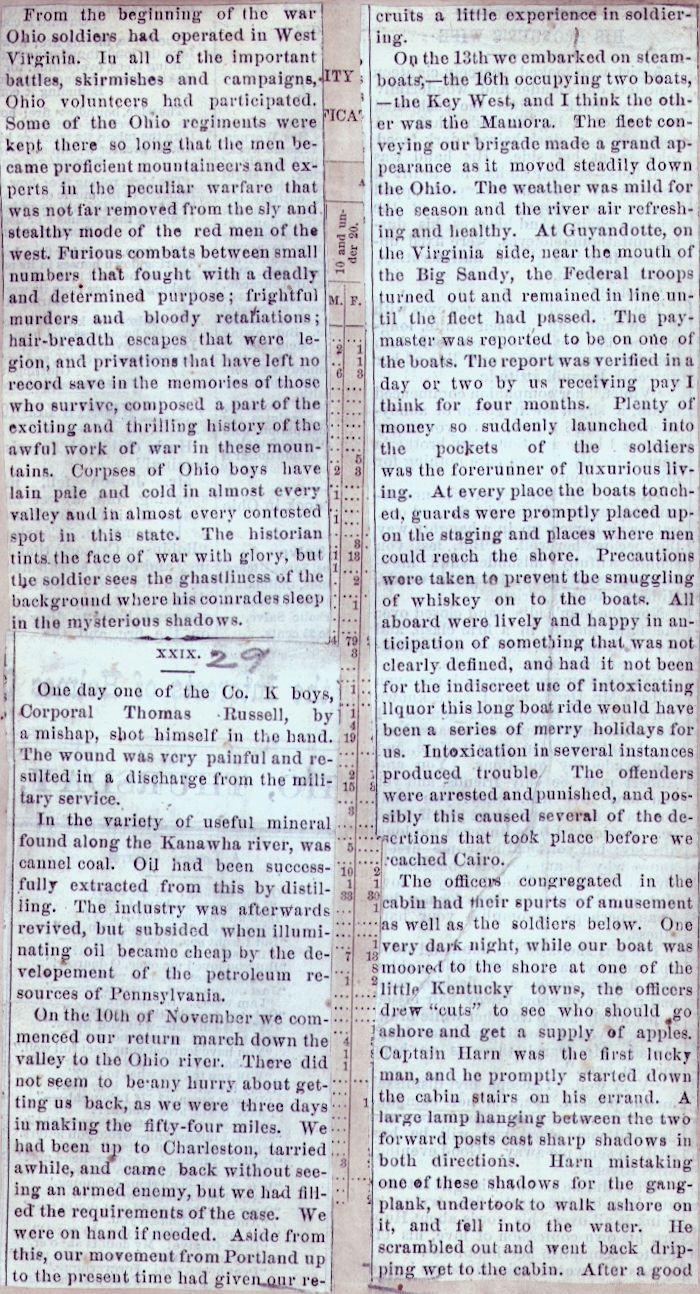| Camp & Field Page 45 | Camp & Field Index Page | 16th OVI Home Page | Camp & Field Page 47 |
The Camp & FieldArticles by Theodore Wolbach |
 Cpl. Theodore D. Wolbach |
The following image is taken from a book titled "Mortality and Statistics of the Census of 1850" in which it is believed retired Captain Rezin H. Vorhes, Company H, pasted over the pages a series of articles written by Cpl. Theodore D. Wolbach, Company E, titled "Camp and Field" and published, by chapter, in the Holmes County (Ohio) Republican newspaper from February 24, 1881 to August 17, 1882. The articles tell the story, in great detail and color, of the 16th OVI, from the inception of the 3-year regiment in October, 1861, through all its camps, battles and marches until it was disbanded on October 31, 1864. The articles pasted in the Vorhes book cover the first 35 chapters, published through October 20, 1881. All the remaining chapters were recently found in a Holmes County library by researcher Rob Garber who obtained copies, performed the transcriptions and provided to this website and which are also presented here, thus providing the complete work by Theodore Wolbach.
Throughout these articles click on the underlined white text for additional details.
The webauthor thanks 16th Ohio descendant Rob Garber for his excellent research on the Camp And Field articles and for performing the tedious digital transcription of those articles found on each page. The transcriptions were made to reflect the original articles verbatim, misspellings and all. Rob is the 3rd great nephew of Capt. William Buchanan, Company F, 16th Ohio, who served in the 90-day regiment as a private, re-enlisting in the three year regiment, and eventually making the rank of Captain of Company F. Thanks Rob!
Page 46 - Chapter 28, 29 - November, 1862
 |
From the beginning of the war Ohio soldiers had operated in West Virginia. In all of the important battles, skirmishes and campaigns, Ohio volunteers had participated. Some of the Ohio regiments were kept there so long that the men became proficient mountaineers and experts in the peculiar warfare that was not far removed from the sly and stealthy mode of the red men of the west. Furious combats between small numbers that fought with a deadly and determined purpose; frightful murders and bloody retaliations; hair-breadth escapes that were legion, and privations that have left no record save in the memories of those who survive, composed a part of the exciting and thrilling history of the awful work of war in these mountains. Corpses of Ohio boys have lain pale and cold in almost every valley and in almost every contested spot in this state. The historian tints the face of war with glory, but the soldier sees the ghastliness of the background where his comrades sleep in the mysterious shadows. Published in Holmes County Republican XXIX. One day one of the Co. K boys, Corporal Thomas Russell, by a mishap, shot himself in the hand. The wound was very painful and resulted in a discharge from the military service. In the variety of useful mineral found along the Kanawha river, was cannel coal. Oil had been successfully extracted from this by distilling. The industry was afterwards revived, but subsided when illuminating oil became cheap by the developement [sic] of the petroleum resources of Pennsylvania. On the 10th of November we commenced our return march down the valley to the Ohio river. There did not seem to be any hurry about getting us back, as we were three days in making the fifty-four miles. We had been up to Charleston, tarried awhile, and came back without seeing an armed enemy, but we had filled the requirements of the case. We were on hand if needed. Aside from this, our movement from Portland up to the present time had given our re- |
cruits a little experience in soldiering. On the 13th we embarked on steamboats,--the 16th occupying two boats,--the Key West, and I think the other was the Mamora. The fleet conveying our brigade made a grand appearance as it moved steadily down the Ohio. The weather was mild for the season and the river air refreshing and healthy. At Guyandotte, on the Virginia side, near the mouth of the Big Sandy, the Federal troops turned out and remained in lie until the fleet had passed. The paymaster was reported to be on one of the boats. The report was verified in a day or two by us receiving pay I think for four months. Plenty of money so suddenly launched into the pockets of the soldiers was the forerunner of luxurious living. At every place the boats touched, guards were promptly place upon the staging and places where men could reach the shore. Precautions were taken to prevent the smuggling of whiskey on to the boats. All aboard were lively and happy in anticipation of something that was not clearly defined, and had it not been for the indiscreet use of intoxicating liquor this long boat ride would have been a series of merry holidays for us. Intoxication in several instances produced trouble. The offenders were arrested and punished, and possibly this caused several of the desertions that took place before we reached Cairo. The officers congregated in the cabin had their spurts of amusement as well as the soldiers below. One very dark night, while our boat was moored to the shore at one of the little Kentucky towns, the officers drew |
| Camp & Field Page 45 | Camp & Field Index Page | 16th OVI Home Page | Camp & Field Page 47 |